五年级英语期末复习词汇句型语法汇总
(完整版)小学五年级英语语法知识汇总
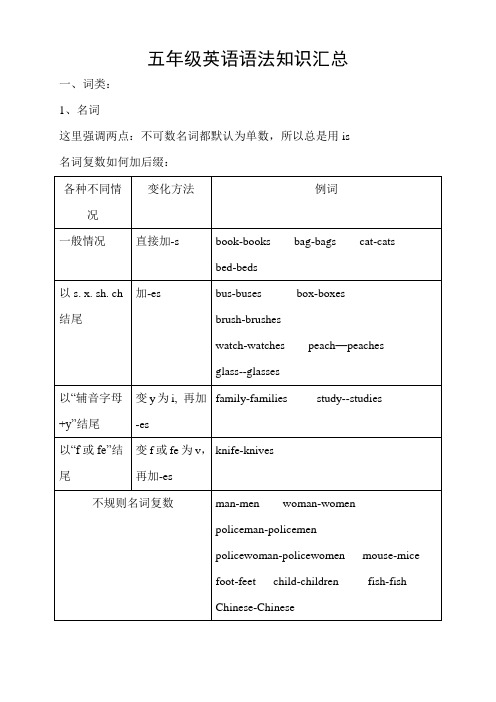
五年级英语语法知识汇总一、词类:1、名词这里强调两点:不可数名词都默认为单数,所以总是用is 名词复数如何加后缀:2、人称代词和物主代词人称代词:有主格和宾格之分。
一般动词前用主格,动词后用宾格。
3、指示代词4、冠词有a、an、the。
a和an的区别:an用于元音音素(一般就是元音字母a、e、i、o、u)前,a用于辅音音素前。
二、否定句:be动词(am、is、are)+not、情态动词can+ not、助动词(do、does)+ not如何将一个肯定的陈述句改为否定句:1、看句中有无be动词,如有,直接在be动词后+ not。
2、看句中有无情态动词,如有,直接在情态动词后+ not。
3、如上述二者都没有,就应用助动词+ not。
分四个步骤:(1)肯定陈述句中本来是没有助动词的,要加上去,位置在主语(某人或某物)后,动词前。
(2)确定助动词用do、does,根据句中动词,动词是原形的助动词就用do,动词是第三人称单数的助动词就用does,(3)在助动词后加not。
(4)原句中动词假如发生变化就要恢复成原形。
强调一点,有some的要考虑是否要用any。
三、一般疑问句。
如何将一个肯定的陈述句改为一般疑问句:1、看句中有无be动词,如有,把be动词提到句首即可。
2、看句中有无情态动词,如有,把情态动词提到句首即可。
3、如上述二者都没有,就应把助动提到句首。
分四个步骤:(1)肯定陈述句中本来是没有助动词的,要加上去,位置在主语(某人或某物)后,动词前。
(2)确定助动词用do还是does,根据句中动词,动词是原形的助动词就用do,动词是第三人称单数的助动词就用does(3)把助动词后提到句首。
(4)原句中动词假如发生变化就要恢复成原形。
强调一点,有some的要考虑是否要用any。
四、特殊疑问句。
表示疑问,有疑问词(在开头),回答有很多种可能。
常用疑问词:五、时态1、一般现在时(1)一般现在时中的be动词:一般用原形:am is aream用于第一人称单数(I);is用于第三人称单数(he she it和其他人名或称谓,如:Ben his sister等);are用于第二人称单数(you)和所有复数(包括第一人称复数we、第二人称复数you;第三人称复数they和其他复数,如the children 、his parents等)。
句型语法复习(素材)教科版(广州)英语五年级下册

【重点句型】1.like/love doing(动词ing形式) sth. 喜爱做某事2.the best time for swimming = the best time to swim .for是介词,后面的动词要用ing形式,to后面用动词原形3.I don’t like summer and I don’t like winter, either.either表示“也〞,用于否认句中,too用于确定句中,两者都放在句末4.I can fly a kite.can 表示“可以〞,为情态动词,后面直接用动词原形。
nothing important, something cold②确定句和盼望得到确定答复的问句用some,否认句和一般疑问句用any7.go for a picnic = go on a picnic = have a picnic 去野餐8.can’t wait to do sth. 迫不及待地想做某事I can’t wait to meet the writer of this book9.单复同形:fish,deer a fish,two fish ; a deer,two deer.10.plan to do... 方案去做......My cousin and I plan to go on a picnic.11.would like to do... 想要做......12.表征求意见的句型:Let’s+动原/Shall we+动原/Do you want to+动原?13.Let’s =Let us让我们Let me 让我14.That sounds great! His idea sounds interesting. sound留意用三单15.Maybe next time.next time 下次16.invite sb. to + 地点邀请某人去某地invite sb. to do sth. 邀请某人做某事17.hope that + 一般将来时句子“盼望......〞〔that没有实际意义〕hope to do盼望做...18.have fun=have a good time玩得快乐19.国家:America,Australia,China , England国籍:American,Australian ,Chinese , English20.sb’s first trip to…某人第一次到某地的旅行(first序数词,可换成second,third...)21.excited“感到兴奋的〞形容人;exciting“令人兴奋的〞形容事物22.buy sth. for sb. 给某人买某物,留意介词for的用法23.safety和danger是名词,safe和dangerous是形容词safety first平安第一be safe是平安的be in danger处于危急中be dangerous是危急的24.“到做……的时间了〞It's time to do sth. 〔动词〕It's time for sth 〔名词〕25.let sb do sth. 让某人做某事26.help sb do sth. 关心某人做某事27.Cooking can be fun. 动词做主语时,需使用动名词,即动词ing形式。
五年级英语知识点总结
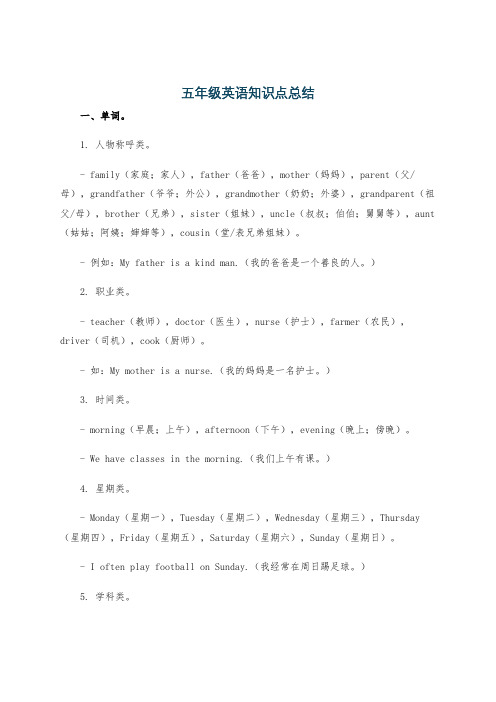
五年级英语知识点总结一、单词。
1. 人物称呼类。
- family(家庭;家人),father(爸爸),mother(妈妈),parent(父/母),grandfather(爷爷;外公),grandmother(奶奶;外婆),grandparent(祖父/母),brother(兄弟),sister(姐妹),uncle(叔叔;伯伯;舅舅等),aunt (姑姑;阿姨;婶婶等),cousin(堂/表兄弟姐妹)。
- 例如:My father is a kind man.(我的爸爸是一个善良的人。
)2. 职业类。
- teacher(教师),doctor(医生),nurse(护士),farmer(农民),driver(司机),cook(厨师)。
- 如:My mother is a nurse.(我的妈妈是一名护士。
)3. 时间类。
- morning(早晨;上午),afternoon(下午),evening(晚上;傍晚)。
- We have classes in the morning.(我们上午有课。
)4. 星期类。
- Monday(星期一),Tuesday(星期二),Wednesday(星期三),Thursday (星期四),Friday(星期五),Saturday(星期六),Sunday(星期日)。
- I often play football on Sunday.(我经常在周日踢足球。
)5. 学科类。
- Chinese(语文),English(英语),maths(数学),science(科学),music(音乐),art(美术),PE(体育)。
- My favourite subject is English.(我最喜欢的学科是英语。
)6. 形容词类。
- young(年轻的),old(年老的;旧的),funny(滑稽的;可笑的),kind (和蔼的;亲切的),strict(严格的)。
- Our English teacher is very kind.(我们的英语老师非常和蔼。
五年级英语知识点总结

五年级英语知识点总结一、词汇积累1. 基础词汇- 学校科目:Math(数学)、Science(科学)、History(历史)、Art(艺术)- 常见动物:Dog(狗)、Cat(猫)、Bird(鸟)、Fish(鱼)- 家庭成员:Mother(母亲)、Father(父亲)、Sister(姐妹)、Brother(兄弟)- 职业:Teacher(教师)、Doctor(医生)、Nurse(护士)、Policeman(警察)- 常见颜色:Red(红色)、Blue(蓝色)、Green(绿色)、Yellow(黄色)- 常见食物:Apple(苹果)、Banana(香蕉)、Chicken(鸡肉)、Rice(米饭)2. 扩展词汇- 学校活动:Reading Club(阅读俱乐部)、Sports Day(运动会) - 节假日:Christmas(圣诞节)、New Year's Day(元旦)- 自然现象:Rain(雨)、Snow(雪)、Thunderstorm(雷暴)- 交通工具:Bicycle(自行车)、Bus(公共汽车)、Train(火车)- 学校设施:Library(图书馆)、Gym(体育馆)、Cafeteria(食堂)二、语法要点1. 时态- 一般现在时:表示经常发生的动作或状态,如:I go to school every day.- 一般过去时:表示过去发生的动作或状态,如:He visited his grandparents last week.- 一般将来时:表示将来发生的动作或状态,如:They will go on a trip next month.2. 代词- 人称代词:I(我)、You(你)、He(他)、She(她)、It (它)、We(我们)、They(他们)- 物主代词:My(我的)、Your(你的)、His(他的)、Her(她的)、Its(它的)、Our(我们的)、Their(他们的)3. 句型结构- 肯定句:The sun rises in the east.- 否定句:The sun does not rise in the west.- 疑问句:Does the sun rise in the east? / The sun doesnot rise in the west, does it?4. 简单句和并列句- 简单句:She reads a book.(她读一本书。
小学五年级英语语法知识点总结大全

小学五年级英语语法知识点总结大全小学五年级英语语法知识点总结大全一be动词(am、is、are)+not、情态动词can+not、助动词(do、does)+not如何将一个肯定的陈述句改为否定句:1、看句中有无be动词,如有,直接在be动词后+not。
2、看句中有无情态动词,如有,直接在情态动词后+not。
3、如上述二者都没有,就应用助动词+not。
分四个步骤:(1)肯定陈述句中本来是没有助动词的,要加上去,位置在主语(某人或某物)后,动词前。
(2)确定助动词用do、does,根据句中动词,动词是原形的助动词就用do,动词是第三人称单数的助动词就用does。
(3)在助动词后加not。
(4)原句中动词假如发生变化就要恢复成原形。
小学五年级英语语法知识点总结大全二1:“first”是序数词,与“the”相连,解释为第一。
2:像“first,term,world”作为词组出现时前面要加“the”。
3:“all”所有;后面的可数名词用复数形式,be动词用“are”。
4:“any”一些;用在否定句和一般疑问句中,与“some”同义。
“some”用在肯定句中。
5:there be+数词,采用“就近原则”。
6:a map of China 与 a map of the world 要牢记。
7:要用“on the wall”,不能用“in the wall”。
门、窗在墙上才能用“in the wall”。
8:can 后+动词原形。
9:play+the+乐器; play+球类;10:like的用法11:动词变动名词形式方法:A--直接在动词后面+ing形式(大多数)。
B--以不发音的“e”结尾的,要去掉e后再+ing,比如:dancing,making,riding。
C--重读be音节,末尾只有一个辅音,须双写末尾的字母后再+ing,如:running,swimming,sitting,putting。
12:现在进行时的构成:be动词+动词ing形式。
教科版五年级英语上学期期末复习资料(三)各单元重点知识

学习必备欢迎下载五年级英语上学期期末复习资料(三)各单元重点知识班级:姓名:Unit 1:What ’ s your hobby?一、兴趣爱好的词组: play computer games, play music,collect stamps, keep pets,make model ships, read books, take photos,make cakes, plant trees, grow flowers, study plants, listening tomusic, singing,dancing,drawing,play the piano, play chess,play basketball⋯二、句型 :1.What’ s your hobby?2. Do you like Yes,⋯? I do. / No, I don’ t.3.I love/like⋯4. I enjoy⋯5.I am good at ⋯6. My (favourite) hobby is⋯7.⋯ is my (favourite) hobby.8. Is your hobby keeping pets?Yes, it is./ No, it isn’ t.三、重点精析:1. love/like/enjoy doing sth喜欢做某事如: I like listening to music.我喜欢听音乐。
2.My hobby is doing sth我的爱好是⋯⋯如: My hobby is reading books.我的爱好是看书。
3. more than⋯多于⋯⋯超,过⋯⋯ from来自于如: I have collected more than 3 hundred stamps from 20 countries.我已收集了来自二十个国家的300 多张邮票。
4. every每一的,每个的every day每天every night每晚 every year每年every Friday每周五5. during +时间表示在某段时间里during the day在白天 during the summer holiday在暑假期间6. some of +名词⋯⋯中的一些如: Some of the students are from America.这些学生中的一些来自美国。
沪教版五年级下册英语期末复习(课本知识点+语法分类+配套练习)

5B期末课本复习Module1Unit 1 日常用语What a mess! What should I do? Whose ball is this? It is Miss Fang ‘s. Are those books hers too?Put all her books on her desk.Can you put it in the box? They are my gloves; these gloves are for my hands.The box falls onto the floor. Be careful. The nails are sharp. Jim’s father gives him a black stone.It is hard and smooth. All the nails stick to the stone. Soon the floor cleans again.Unit 2日常用语Do you know how a …… ?But now I am a butterfly ,flying high in the bright blue sky . First ……Next……Then….. Finally……A butterfly is an interesting insect. It was a white egg, now it is a green caterpillar. It likes eating leaves.It was a brown cocoon, now it is a beautiful blue butterfly. I put the silkworms on the leaves. The silkworms are small, now they are big, they can make a lot of silk.The cocoons open ,five silkworms come out. They can lay eggs. Caterpillars like eating leaves. Once I was a baby ,crying in my bed . But now I am big and tall, playing happily with my football.It is born in a river, it is black and small. Your mum has big eyes and mouth and she can catch flies. Unit 3日常用语It is too noisy outside. She heard another noise . Ben did not like it at all. Sometimes it is so noisy .It was Saturday afternoon ,kitty was at home ,she wants to read a book. But it was too noisy outside. Finally, it was quiet. They sat on the sofa and watched a cartoon.What noise can you hear around you?There was a pop group at City Square. They played some loud music.Ben enjoyed the loud music very much, he had great time.Kitty wants to play some loud music for Ben .My city is a noisy place, with all the cars and buses. My city is a noisy place, but it’s not loud everywhere.I love going to the library to read the good books here.On Sunday morning ,it’s always nice and quiet, I can hear the birds singing.The kings birthday is coming.He wants to listen the loudest noise in the world, so all the people must shout together at 12 o’clock. On his birthday.All the people hear about his idea. At 12 o’clock. On the king’s birthday, people all open their mouths and listen.They hear the songs of the birds and the river. After that people do everything quietly.Module2Unit1 重点句型What did you have for breakfast this morning ? I had ……Breakfast is very important . We should eat breakfast every morning .…… is /are my favourite food /breakfast .An apple a day keeps the doctor away .What happens to you ?= what's wrong with you ?= what is up /matter withe you ?Unhealthy children eat a lot of sweets, hamburgers , ice cream and chocolates, they drink a lot of soft drinks.Unhealthy children do not play sport very often , they watch too much TV and eat too much sweet food .Healthy children like running ,jumping ,and playing , they eat a lot of fruit ,vegetables and some meat.Matte eats all day and night ,soon he becomes very fat .Unit 2重点句子Here we are. Be quick.Shall we go to see a film this evening ? Which film do you want to see ?That’s 80 yuan,please. It’s on at two o’ clock.Can I have three ticket for Snow White , please ?--Can I have a cup of tea ,please ? --Yes, you can . Here you are.Let’s leave at one thirty .That’s a good idea ! All right!The film starts in five minutes. Let me buy the ticket first.Who is the fairest of all? She looks like an old woman .The hunter takes Snow White into a forest and let her go.Shall I help you carry your bag ?Unit 3重点句子What classes do we have today ? We have Chinese, Maths , Art and IT in the morning.What is your favourite subject ?There is a short break after each class. It’s time for Chinese class .In PE class we have great fun . What do you think ,Danny?Thanks for your help , Danny! This is my timetable for today .At school we learn thing every day . In Maths class we count from one to ten.He draws some lines and dots on the paper. Peter looks at his paper carefully.Maybe I will draw a house in the rain. It needs some colour .He colours his picture.Module3Unit1日常用语You can’t ride here. Look at the sign. You can't walk your dog here. No smoking/swimming.They are sitting on the bench. The park keeper comes. Don't litter/throw rubbish .Don't walk on the grass.What does this sign mean/say? It means/says we can’t swim.We want to have a picnic in the park.I want to pick some beautiful flowers. She said to herself. He put some stones into his pocket. On the way to the forest ,he dropped the stones. We are lost. Don't worry. We can follow the stones back home .I’ll come back.Unit2常用语It will be windy tonight.How is the weather today? =What is the weather like today ?What is the temperature today? It is 30 degrees.What day is today? It is Sunday .What is the date today? It is 1st of May.What is your favourite season? I love summer.We had a hot and sunny day yesterday.We will have heavy rain and a strong wind tomorrow. I like the rain ,it helps my plants grow.I don't like the wind ,it blows my plants down. I like the sun ,it makes my plants strong.A typhoon is coming from the East China Sea . I don't like hot weather at all. In summer there is a lot of rain ,the plants grow quickly. It is warm and comfortable in house in winter.询问天气特殊疑问句:问今天的天气:What is the weather like today ?It is windy and sunny.What is the temperature today? It is 28 degrees问昨天的天气:What was the weather like yesterday ?It was hot.What was the temperature today? It was 32 degrees.问明天的天气:What will the weather be like tomorrow? It will be windy tonight.unit 3日常用语Let’s give him a surprise.What can we do?Let's move the furniture. Yes, let’s do that.We can put the table next to the wall.What is different? What else?I c an’t remember. The sofa was under the shelf , now it is next to the shelf.You are right. Where was it ? Many years ago , Shanghai was a mall village . Not many people lived here. Many of them were fishermen and farmers. Later ,people from other places came to Shanghai and it became a town. There are a lot of tall buildings. There are a lot of photos of old Shanghai. What can you see in the Shanghai History Museum?What was Shanghai like many years ago?Module4Unit1重要句型:1.He can... 2.Which museum do you want ...?3.Why?Because...4.What did you...?语法:1.情态动词 2.一般过去时 3.特殊疑问句What did you see there? Which museum do you want to visit?Unit2重要句型:1.When's...It's on... 2.What do you do at...3.We usually...4.What's your favourite...语法: 1.一般现在时 2.特殊疑问句What's your favourite holiday?Unit3重点句型:Both...and.. .do not ....either5B期末归类复习一、代词人称代词主格:作主语,表示谁怎么样了、干什么了。
新版PEP五年级英语下册期末复习总结

新版PEP五年级英语下册期末复习总结新版PEP五年级英语下册期末复习总结第⼀单元⼀、重点词汇。
eat breakfast吃早餐have···class 上···课play sports 进⾏体育运动exercise 活动,运动do morning exercises早锻炼eat dinner吃晚饭clean my room 打扫我的房间go for a walk 散步go shopping 去购物dance舞蹈take a dancing class 上舞蹈课a.m上午p.m.下午usually 通常地⼆、其他⽇常活动。
get up起床eat lunch吃午饭go to bed 上床睡觉wash my face洗脸wash my clothes 洗我的⾐服watch TV看电视play ping-pong打乒乓球play the pipa弹琵琶go swimming 去游泳go running去跑步do homework 做作业do kungfu练武术play football踢⾜球play basketball打篮球X k B 1 . c o m三、课本句⼦1.–When do you finish class in the morning?你们上午的课到⼏点结束?–We finish class at1o’clock.我们⼀点钟结束。
2.–When do you usually eat dinner in Spain?在西班⽛你们通常什么时候吃晚饭?–Usually at9:30or10o’clock.通常在九点三⼗或⼗点钟。
3.–Why are you shopping today?今天为什么是你购物?–My mum worked last night.So I’m shopping today.我妈妈昨晚上班了。
所以今天我购物。
五年级英语下册期末复习重点
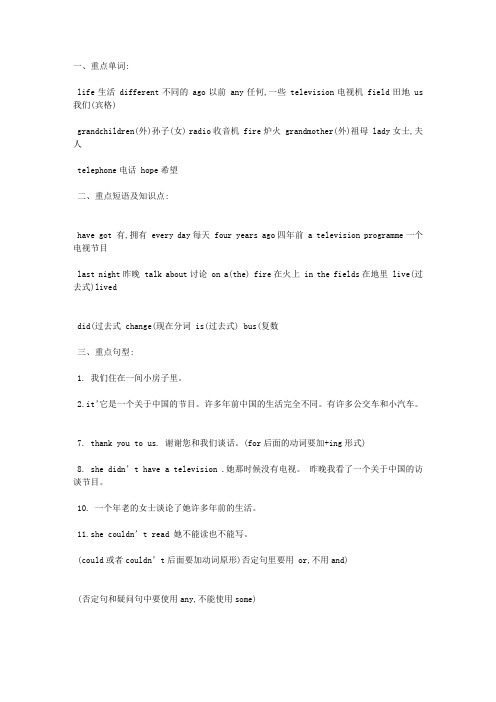
一、重点单词:life生活 different不同的 ago以前 any任何,一些 television电视机 field田地 us 我们(宾格)grandchildren(外)孙子(女) radio收音机 fire炉火 grandmother(外)祖母 lady女士,夫人telephone电话 hope希望二、重点短语及知识点:have got 有,拥有 every day每天 four years ago四年前 a television programme一个电视节目last night昨晚 talk about讨论 on a(the) fire在火上 in the fields在地里 live(过去式)liveddid(过去式 change(现在分词 is(过去式) bus(复数三、重点句型:1. 我们住在一间小房子里。
2.it’它是一个关于中国的节目。
许多年前中国的生活完全不同。
有许多公交车和小汽车。
7. thank you to us. 谢谢您和我们谈话。
(for后面的动词要加+ing形式)8. she didn’t have a television .她那时候没有电视。
昨晚我看了一个关于中国的访谈节目。
10. 一个年老的女士谈论了她许多年前的生活。
11.she couldn’t read 她不能读也不能写。
(could或者couldn’t后面要加动词原形)否定句里要用 or,不用and)(否定句和疑问句中要使用any,不能使用some)qiu jiagou.我在邱家沟。
(情景连线)第二模块一、重点单词:learnt(learn的过去式)学习 these这些 dancer舞蹈演员 class班级 study学习 hard 努力的retired退休的二、重点短语及知识点:dance( learn(过去式 learn(现在分词 make(过去式 teach(过去式) study(过去式 -go(三单 dance(名词)三、重点句型:因为她是个舞蹈演员。
小学五年级英语语法知识点总结大全
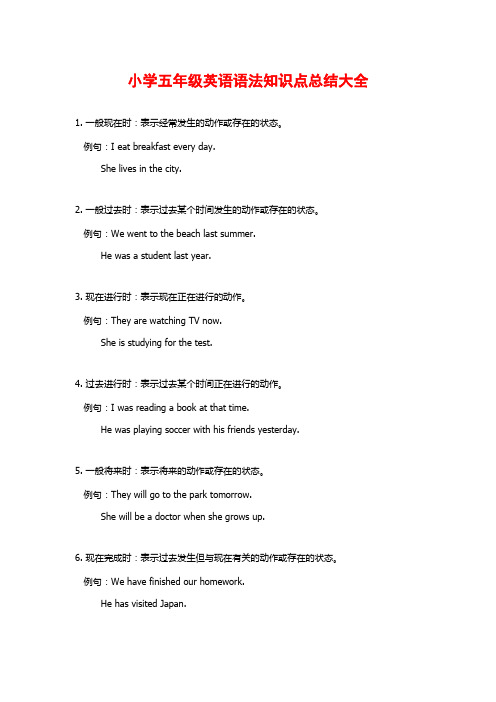
小学五年级英语语法知识点总结大全1. 一般现在时:表示经常发生的动作或存在的状态。
例句:I eat breakfast every day.She lives in the city.2. 一般过去时:表示过去某个时间发生的动作或存在的状态。
例句:We went to the beach last summer.He was a student last year.3. 现在进行时:表示现在正在进行的动作。
例句:They are watching TV now.She is studying for the test.4. 过去进行时:表示过去某个时间正在进行的动作。
例句:I was reading a book at that time.He was playing soccer with his friends yesterday.5. 一般将来时:表示将来的动作或存在的状态。
例句:They will go to the park tomorrow.She will be a doctor when she grows up.6. 现在完成时:表示过去发生但与现在有关的动作或存在的状态。
例句:We have finished our homework.He has visited Japan.7. 过去完成时:表示过去某个时间之前已经发生的动作。
例句:I had already eaten dinner when they arrived.She had studied for the test before she took it.8. 一般将来时:表示将来某个时间将要发生的动作或存在的状态。
例句:We will be having a party next week.They will be traveling around the world.9. 一般将来时:表示将来某个时间将要发生的动作或存在的状态。
小学五年级英语语法知识点总结大全
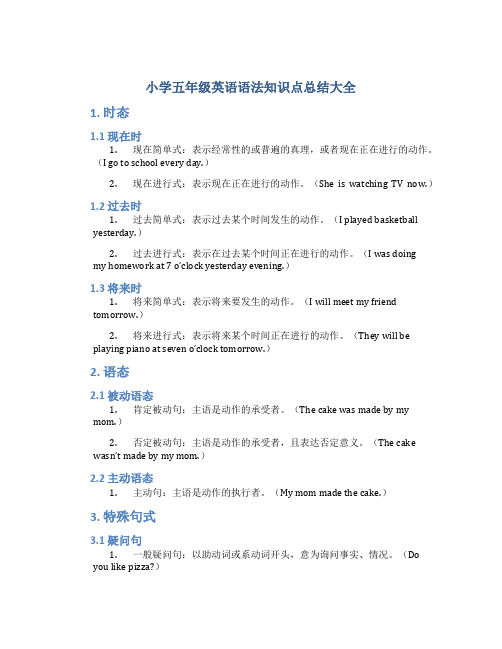
小学五年级英语语法知识点总结大全1. 时态1.1 现在时1.现在简单式:表示经常性的或普遍的真理,或者现在正在进行的动作。
(I go to school every day.)2.现在进行式:表示现在正在进行的动作。
(She is watching TV now.)1.2 过去时1.过去简单式:表示过去某个时间发生的动作。
(I played basketball yesterday.)2.过去进行式:表示在过去某个时间正在进行的动作。
(I was doingmy homework at 7 o’clock yesterday evening.)1.3 将来时1.将来简单式:表示将来要发生的动作。
(I will meet my friend tomorrow.)2.将来进行式:表示将来某个时间正在进行的动作。
(They will be playing piano at seven o’clock tomorrow.)2. 语态2.1 被动语态1.肯定被动句:主语是动作的承受者。
(The cake was made by my mom.)2.否定被动句:主语是动作的承受者,且表达否定意义。
(The cake wasn’t made by my mom.)2.2 主动语态1.主动句:主语是动作的执行者。
(My mom made the cake.)3. 特殊句式3.1 疑问句1.一般疑问句:以助动词或系动词开头,意为询问事实、情况。
(Do you like pizza?)2.特殊疑问句:以疑问词作为开头,意为询问特定事物或情况。
(What do you want for breakfast?)3.2 祈使句表示请求、劝告或命令。
(Do your homework now.)3.3 感叹句表示强烈的感情或感叹。
(What a beautiful flower!)4. 词汇4.1 名词1.可数名词:表示可以数出来的事物,前面可以加a, an或者数字。
(人教PEP版)五年级英语语法复习要点归纳.doc
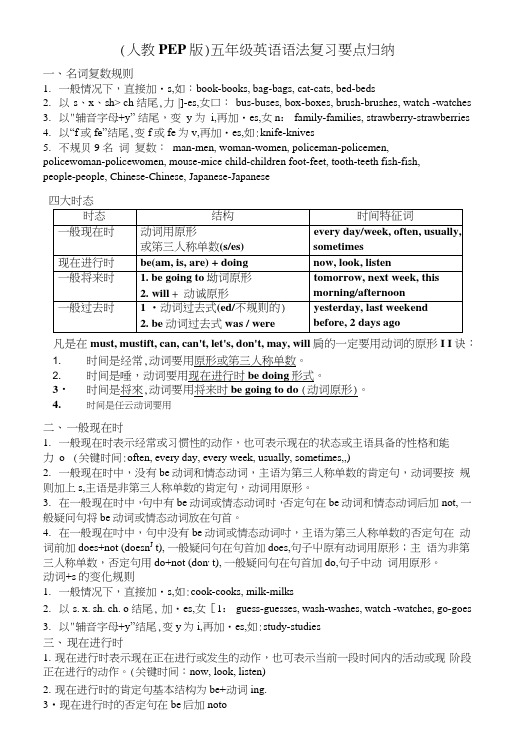
(人教PEP版)五年级英语语法复习要点归纳一、名词复数规则1.一般情况下,直接加・s,如:book-books, bag-bags, cat-cats, bed-beds2.以s、x、sh> ch 结尾,力|]-es,女口:bus-buses, box-boxes, brush-brushes, watch -watches3.以"辅音字母+y” 结尾,变y 为i,再加・es,女n: family-families, strawberry-strawberries4.以“f或fe”结尾,变f或fe为v,再加・es,如:knife-knives5.不规贝9 名词复数:man-men, woman-women, policeman-policemen,policewoman-policewomen, mouse-mice child-children foot-feet, tooth-teeth fish-fish,people-people, Chinese-Chinese, Japanese-Japanese四大时态凡是在must, mustift, can, can't, let's, don't, may, will 肩的一定要用动词的原形I I诀:1. 时间是经常,动词要用原形或笫三人称单数。
2. 时间是唾,动词要用现在进行时be doing形式。
3・时间是将來,动词要用将来时be going to do (动词原形)。
4. 时间是任云动词要用二、一般现在时1.一般现在时表示经常或习惯性的动作,也可表示现在的状态或主语具备的性格和能力o (关键时间:often, every day, every week, usually, sometimes,,)2.一般现在时中,没有be动词和情态动词,主语为第三人称单数的肯定句,动词要按规则加上s,主语是非第三人称单数的肯定句,动词用原形。
五年级英语语法知识点总结
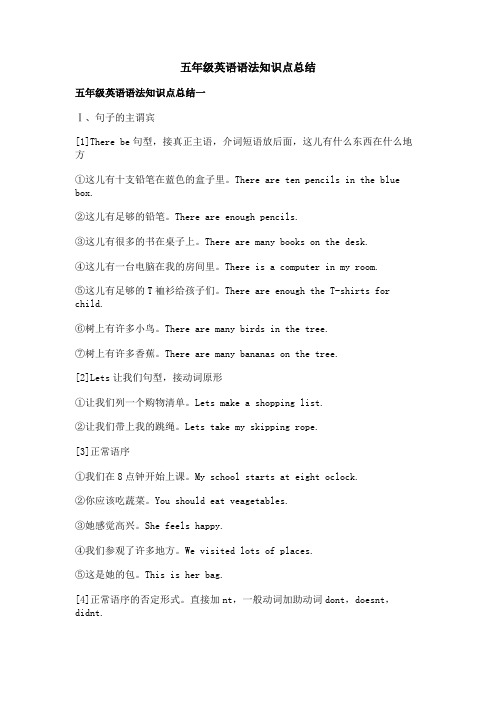
五年级英语语法知识点总结五年级英语语法知识点总结一Ⅰ、句子的主谓宾[1]There be句型,接真正主语,介词短语放后面,这儿有什么东西在什么地方①这儿有十支铅笔在蓝色的盒子里。
There are ten pencils in the blue box.②这儿有足够的铅笔。
There are enough pencils.③这儿有很多的书在桌子上。
There are many books on the desk.④这儿有一台电脑在我的房间里。
There is a computer in my room.⑤这儿有足够的T裇衫给孩子们。
There are enough the T-shirts for child.⑥树上有许多小鸟。
There are many birds in the tree.⑦树上有许多香蕉。
There are many bananas on the tree.[2]Lets让我们句型,接动词原形①让我们列一个购物清单。
Lets make a shopping list.②让我们带上我的跳绳。
Lets take my skipping rope.[3]正常语序①我们在8点钟开始上课。
My school starts at eight oclock.②你应该吃蔬菜。
You should eat veagetables.③她感觉高兴。
She feels happy.④我们参观了许多地方。
We visited lots of places.⑤这是她的包。
This is her bag.[4]正常语序的否定形式。
直接加nt,一般动词加助动词dont,doesnt,didnt.①昨天我没有骑自行车。
I didnt ride a bike yesterday.②这个老人没有坐下。
This old man don‘t sit down.③我们不应该在教室里下棋。
We shouldnt play chess in the class.④我根本不能做2。
(完整版)小学五年级英语语法知识汇总
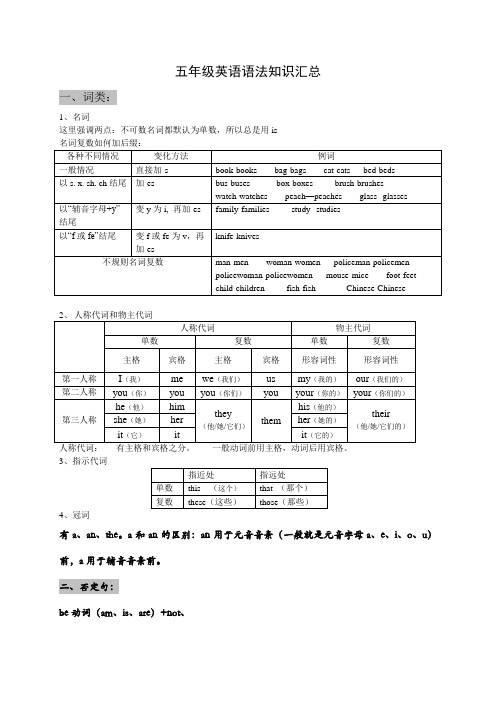
五年级英语语法知识汇总一、词类:1、名词这里强调两点:不可数名词都默认为单数,所以总是用is人称代词:有主格和宾格之分。
一般动词前用主格,动词后用宾格。
3、指示代词4、冠词有a、an、the。
a和an的区别:an用于元音音素(一般就是元音字母a、e、i、o、u)前,a用于辅音音素前。
二、否定句:be动词(am、is、are)+not、情态动词can+ not、助动词(do、does)+ not如何将一个肯定的陈述句改为否定句:1、看句中有无be动词,如有,直接在be动词后+ not。
2、看句中有无情态动词,如有,直接在情态动词后+ not。
3、如上述二者都没有,就应用助动词+ not。
分四个步骤:(1)肯定陈述句中本来是没有助动词的,要加上去,位置在主语(某人或某物)后,动词前。
(2)确定助动词用do、does,根据句中动词,动词是原形的助动词就用do,动词是第三人称单数的助动词就用does,(3)在助动词后加not。
(4)原句中动词假如发生变化就要恢复成原形。
强调一点,有some的要考虑是否要用any。
三、一般疑问句。
如何将一个肯定的陈述句改为一般疑问句:1、看句中有无be动词,如有,把be动词提到句首即可。
2、看句中有无情态动词,如有,把情态动词提到句首即可。
3、如上述二者都没有,就应把助动提到句首。
分四个步骤:(1)肯定陈述句中本来是没有助动词的,要加上去,位置在主语(某人或某物)后,动词前。
(2)确定助动词用do还是does,根据句中动词,动词是原形的助动词就用do,动词是第三人称单数的助动词就用does(3)把助动词后提到句首。
(4)原句中动词假如发生变化就要恢复成原形。
强调一点,有some的要考虑是否要用any。
四、特殊疑问句。
表示疑问,有疑问词(在开头),回答有很多种可能。
常用疑问词:五.时态1、一般现在时(1)一般现在时中的be动词:一般用原形:am is aream用于第一人称单数(I);is用于第三人称单数(he she it和其他人名或称谓,如:Ben his sister等);are用于第二人称单数(you)和所有复数(包括第一人称复数we、第二人称复数you;第三人称复数they和其他复数,如the children 、his parents等)。
pep小学英语五年级上册期末总复习--单词+句型+语法练习
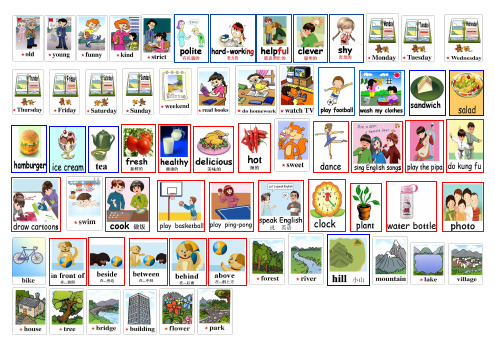
1.What’s = What is什么样?是什么?做什么?What’s she like? 她怎么样?--She is kind. 她很善良。
What is Sarah like? Sarah怎么样?--She is helpful. 她很能干。
(What is …like? 问的是某人怎样,回答用形容词polite, hard-working等)What is your favourite food ?你最喜欢的食物是什么?-- Noodles. 面条。
What is your favourite drink? 你最喜欢的饮料是什么?--Coke. 可乐。
What day is it today? 今天星期几?--It’s Wednesday. 星期三。
What do you have on Wednesday s? 你每周三上什么课?--I have English and music. What do you often do on the weekend? 你周末做什么?--I often read books.What would you like to eat? 你想吃什么?--I’d like a sandwich. (回答食物)What would you like to drink? 你想喝什么? --I’d like some tea. (回答饮料)What can you do? 你会做什么?--I can swim. 我会游泳。
What can Chen Jie do? 陈洁会做什么?--She can play the pipa. 她会弹琵琶。
What can Zhang Peng do? 他会做什么?--He can draw cartoons. 他会画卡通。
What can they do? 他们会做什么?--They can cook. 他们会做饭。
2. Who’s = Who is是谁?回答用人名或者人物关系。
五年级英语语法知识点总结顺口溜

五年级英语语法知识点总结顺口溜一、名词单复数。
名词单数变复数,规则要记住。
一般直接加 -s,book变books真清楚。
s, x, ch, sh结尾,加上 -es别糊涂,box变boxes,brush变brushes有风度。
辅音字母加y尾,y变i加 -es,baby变babies,快乐无差池。
f或fe结尾,把f或fe变v再加 -es,knife变knives,妻子(wife)变wives很合适。
二、be动词用法。
我(I)用am,你(you)用are,is连着他(he)她(she)它(it)。
单数名词用is,复数名词全用are。
变否定,be后加not就好啦,is not缩写是isn't,are not缩写是aren't呀。
变疑问,be要提前,句末问号别落下。
三、一般现在时。
一般现在时,经常发生事。
主语三单他她它,动词后面加 -s或 -es。
其他人称用原形,这一点要记清。
经常习惯和真理,都用一般现在时。
否定句,don't或doesn't来帮你,动词原形后面立。
一般疑问句,do或does句首提,回答yes或no,简单又清晰。
四、形容词性物主代词。
我的my,你的your,他的his,她的her,它的its别搞错。
我们的our,你们的your,他们的their要记着。
形容词性物主代词,后面名词跟着我。
五、基数词变序数词。
基变序,有规律,词尾加上 -th。
一二三,特殊记,词尾字母t, d, d。
八减t,九减e,f来把ve替。
整十基数变序数,y变ie加 -th。
若是遇到几十几,只变个位就可以。
- 1、下载文档前请自行甄别文档内容的完整性,平台不提供额外的编辑、内容补充、找答案等附加服务。
- 2、"仅部分预览"的文档,不可在线预览部分如存在完整性等问题,可反馈申请退款(可完整预览的文档不适用该条件!)。
- 3、如文档侵犯您的权益,请联系客服反馈,我们会尽快为您处理(人工客服工作时间:9:00-18:30)。
五年级英语期末复习词汇、句型、语法汇总Module 1Vocabulary:(词汇)Year年 before以前 duck鸭子 playground操场 park公园different不同的 swing秋千 only 只,仅仅 slide滑梯 pond池塘 here这里 there那里 feed喂养 then然后 look at看… lots of=a lot of许多 little小的,极少数的 now现在is/am—was 是is/amn’t—wasn’t不是 are—were是aren’t—weren’t不是 can—could能can’t—couldn’t不能let’s=let us让我们…Sentences:(重点句子)1. There wasn’t a pond here before!这里以前没有池塘。
2. There weren’t any swings here before.这里以前没有很多秋千。
Grammer:(语法)There be句型的用法(这有…)1. There was/were…这以前有…2.There wasn’t/weren’t…这以前没有…3.Now there is/are…现在这有…4.Now there isn’t/aren’t…现在这没有…Module 2Vocabulary:(词汇)Heavy重的 shopping购物 lift提,抬 sell卖 country国家,农村 sometimes有时 restaurant餐厅 supermarket超市 sweet糖果 fruit水果 help 帮助 put放 helpful乐于助人的 many﹢可数名词(许多…) ice cream雪糕,冰激凌 thing事物,事件 food 食物 also也 clothes衣服 toy玩具 together一起 watermelon西瓜 want to﹢动词原形(想要…) come on过来,加油 over there在那里 child(单)—children(复)孩子Sentences:(重点句子)1. There are many fruits.这有许多水果。
2. This one is heavy.这个很重。
3. What do you want?你想要什么?4.I want …我想要…Grammer:(语法)Be going to的用法(将要…)1.主语(He/She/We/They/Sam…)﹢be(am/is/are/was/were) going to ﹢动词原形(某人将要做…)Module 3Vocabulary:(词汇)Night晚上,夜晚 why为什么 Halloween万圣节 autumn 秋天 festival节日 really真的,的确 fun有趣的 wear穿 scary害怕的(形容词) mask面具 scare 吓唬(动词) give给 these这些 chick鸡 flower 花 Easter复活节 spring春天 summer夏天 winter 冬天 when什么时候 month月份 January一月 February二月 March三月 April四月 May五月 June六月 July七月 August八月 September九月 October十月 November十一月 December十二月 feel感觉 learn学习Sentences:(重点句子)1. They go to people’s houses.他们去人们的房子。
2. They scare the people.他们吓唬人们。
Module 4Vocabulary:(词汇)Invitation邀请函,请柬 reply回复,回答 birthday生日 celebrate庆祝 party聚会 lunch午餐,午饭 make制作 cake蛋糕 sing唱歌 dance跳舞after …之后 go home回家 play with 玩某物,和某人玩 tidy up整理 flute笛子Sentences:(重点句子)1. What are we going to do?我们将要做什么?We are going to …我们将要…2.Are you going to have a birthday cake?你将要做一个生日蛋糕吗?Yes,I am./ No,I’m not.是,我要做。
∕不,我不做。
Module 5Vocabulary:(词汇)Matter事情,事件 both两者都,都 wet潮湿,湿的 whose 谁的 dress裙子 rain雨 favourite最爱的,最喜欢的 skirt短裙 dirty脏的 shoe鞋子 laugh大笑Amy’s(人名后添加’s表示谁谁的)艾米的… run home跑回家Sentences:(重点句子)1.Whose T-shirt is this?这件衬衫是谁的?2.It’s hers.这是她的。
3.It isn’t hers. 这不是她的。
4.It isn’t his. 这不是他的。
5.It’s mine. 这是我的。
Grammer:(语法)1. 物主代词:表示所有关系的代词。
①形容词性物主代词;②名词性物主代词。
2. 形容词性物主代词名词性物主代词My → mine我的Your →yours你的Her → hers她的His → his他的Our → ours我们的Their → theirs 他们的Its → its它的Module 6Vocabulary:(词汇)True正确的,事实 point分数,分值 team队伍 thirty-six 36 basketball篮球 run跑步 fast 快速的 catch抓住 well好地 jump跳 really真地 high高 play the flute吹笛子 play the drum打架子鼓 row a boat划船 other其他的 play-played玩 get-got获得 win-won赢 are-were是 is-was是Sentences:(重点句子)1.Can you run fast?你能跑地很快吗?Yes, I can. /No, I can’t.是的,我能。
∕不,我不能。
2.You can play basketball well.你打篮球很好。
3.They got fifty points.他们得了50分。
Grammer:(语法)1.Can的用法(can﹢动词原形)能做…Can you…?你能…Yes, I can. /N o, I can’t.是的,我能。
∕不,我不能。
主语(I/She/He/They…)﹢can﹢动词原形You can play basketball well.你打篮球很好。
2.数词:a.基数词;b.序数词。
a.基数词:表示数目的个数。
1 2 3 4 5 …one two three four five …b.序数词:表示顺序,名次,日期,楼层… ,译为第…构成:基数词后加th.(除了first第一 second第二 third 第三),个别的基数词发生变化(第五fifth…)Module 7Vocabulary:(词汇)Blind盲的,瞎的 special特别的,特殊的 hear听见 fire火 inside在…里面 safe安全的 deaf聋的 dumb哑的,哑巴 TV show=TV programme电视节目 presenter主持人 clever聪明的 guide引导,指导 fireman(单数)→firemen(复数)消防员 see看见 cute可爱的 climb攀爬Sentences:(重点句子)1.This dog can help him.这只狗能够帮助他。
2.Can Fifi help the blind people?菲菲能够帮助盲人吗?Grammer:(语法)过去时,表示某个时间里发生的动作或状态,过去习惯性,经常性的动作,行为。
表示过去的时间状语ago, yesterday, the day before yesterday, last week, just now等常常喜欢尾随在我的后面。
一起来了解我的三种不同句式吧。
1.一般过去时陈述句:主语﹢动词过去式﹢其他部分。
如:I played the piano five years ago. (五年前我弹钢琴)。
2.一般过去时的一般疑问句:① Did﹢主语﹢动词原形﹢其它部分?如:—Did they buy ice cream?(他们买雪糕了吗?)—Yes, they did. /No, they didn’t.(是的,他们买了。
/ 不,他们没买。
)回答的时候如果是肯定回答,就用yes,主语﹢did. 否定回答就用No, 主语﹢didn’t.②Was/Were﹢主语﹢其它部分?如:—Were you happy yesterday?(昨天你高兴吗?)—Yes, I was. /No, I wasn’t.(是的,我很高兴。
/ 不,我不高兴。
3.一般过去时的特殊疑问句:①特殊疑问词﹢did﹢主语﹢V原形﹢其他部分?如:How did you travel to Hainan the day before yesterday?(前天你去海南旅游的怎么样?)②特殊疑问词﹢was/were﹢主语﹢其他部分?如:When was he good at dancing?(他什么时候爱好跳舞?)Module 8Vocabulary:(词汇)Line排,列 morning exercises(复数)做早操miss想念 break课间,打碎,打破 study学习 take photo拍照 sit around table围着桌子坐 start开始 finish结束 fun乐趣,有趣的 painting画,图画 lots of=a lot of许多 at break time在课间 study hard努力学习 every day每天 get up起床 subject课程,科目 go to bed上床睡觉 get ready for准备…Sentences:(重点句子)1. In England, they sit around tables.在英国,他们围着桌子坐。
2. In China, we sit in lines.在中国,我们做成排。
3. They sing song together every morning.他们每天早晨一起唱歌。
4. We do morning exercises.我们做早操。
